2020 Toyota 4Runner Tires, Repair & Service
Get Started
Complete Auto Care for Your 2020 Toyota 4Runner
-
TIRES FOR YOUR 2020 Toyota 4Runner View Tire Info GET TIRE PRICING
-
REPAIR FOR YOUR 2020 Toyota 4Runner View Repair Info SCHEDULE REPAIR
-
MAINTENANCE FOR YOUR 2020 Toyota 4Runner View Maintenance Info SCHEDULE MAINTENANCE
-
OFFERS FOR YOUR 2020 Toyota 4Runner Limited Time Tire Offers VIEW ALL COUPONS
2020 Toyota 4Runner Tires
Recommended Tires | Tire Information
2020 Toyota 4Runner Tires Sizes, Speed Ratings, and Inflation
Not sure about your 2020 Toyota 4Runner tire size? Use the following chart to find information on tire size, speed rating, and inflation.
| Trim Level | Speed Rating | Inflation in PSI F/R | Tire Size |
|---|---|---|---|
| 2020 Toyota 4Runner SR5 | S | 32 PSI/32 PSI | P265/70R17 |
| 2020 Toyota 4Runner Nightshade | H | 32 PSI/32 PSI | P245/60R20 |
| 2020 Toyota 4Runner Limited | H | 32 PSI/32 PSI | P245/60R20 |
| 2020 Toyota 4Runner TRD Off-Road | S | 32 PSI/32 PSI | P265/70R17 |
| 2020 Toyota 4Runner SR5 Premium | S | 32 PSI/32 PSI | P265/70R17 |
| 2020 Toyota 4Runner TRD Pro | S | 32 PSI/32 PSI | P265/70R17 |
| 2020 Toyota 4Runner Venture | S | 32 PSI/32 PSI | P265/70R17 |
| 2020 Toyota 4Runner TRD Off-Road Premium | S | 32 PSI/32 PSI | P265/70R17 |
|
2020 Toyota 4Runner SR5 Speed Rating: S Inflation F/R: 32 PSI/32 PSI |
|
2020 Toyota 4Runner Nightshade Speed Rating: H Inflation F/R: 32 PSI/32 PSI |
|
2020 Toyota 4Runner Limited Speed Rating: H Inflation F/R: 32 PSI/32 PSI |
|
2020 Toyota 4Runner TRD Off-Road Speed Rating: S Inflation F/R: 32 PSI/32 PSI |
|
2020 Toyota 4Runner SR5 Premium Speed Rating: S Inflation F/R: 32 PSI/32 PSI |
|
2020 Toyota 4Runner TRD Pro Speed Rating: S Inflation F/R: 32 PSI/32 PSI |
|
2020 Toyota 4Runner Venture Speed Rating: S Inflation F/R: 32 PSI/32 PSI |
|
2020 Toyota 4Runner TRD Off-Road Premium Speed Rating: S Inflation F/R: 32 PSI/32 PSI |
* Note: these models have different tire sizes depending on vehicle options.
Recommended Tires for Your 2020 Toyota 4Runner
What tires are best for a 2020 Toyota 4Runner? Check out the following tire brands and types.
 ALENZA AS ULTRA
ALENZA AS ULTRA
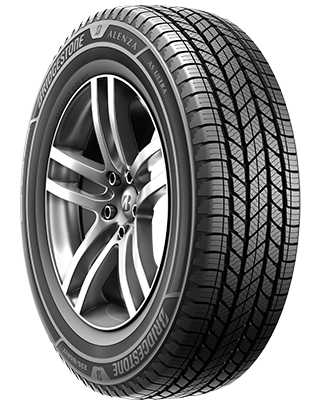
- No warranty
- All-Season
- Light Truck Tires
 Dueler H/T 684 II
Dueler H/T 684 II
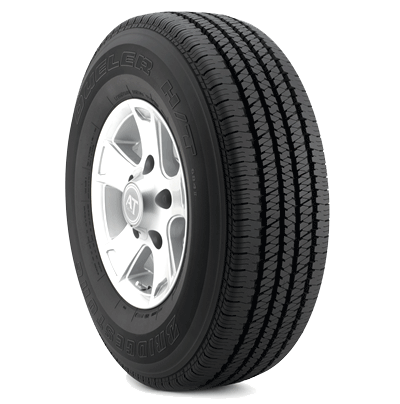
- Platinum Pact Limited Warranty
- All-Season
- Light Truck Tires
 Blizzak DM-V2
Blizzak DM-V2
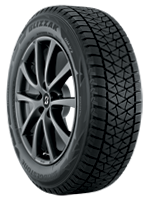
- No warranty
- Winter
- Winter
 Dueler A/T Revo 3
Dueler A/T Revo 3
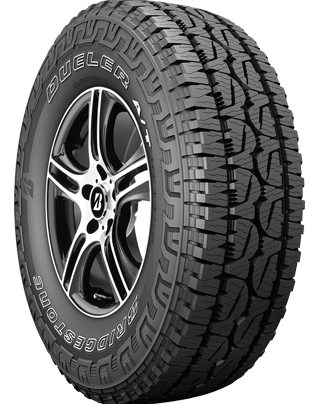
- Platinum Pact Limited Warranty
- All-Season
- Light Truck Tires
 Dueler A/T Revo 3 - LT
Dueler A/T Revo 3 - LT
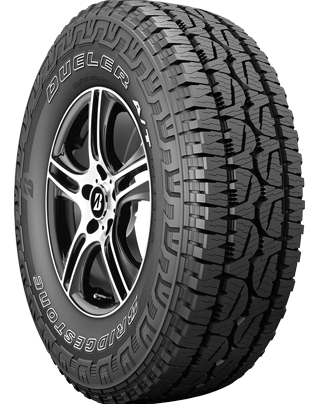
- Platinum Pact Limited Warranty
- All-Season
- Light Truck Tires
 Dueler A/T RH-S
Dueler A/T RH-S
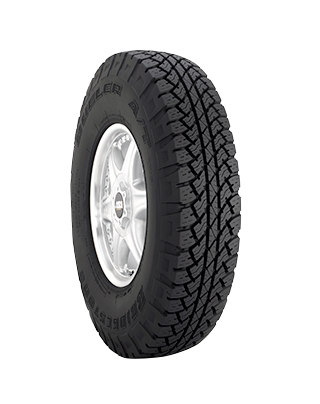
- Platinum Pact Limited Warranty
- All-Season
- Light Truck Tires
 Destination A/T2
Destination A/T2
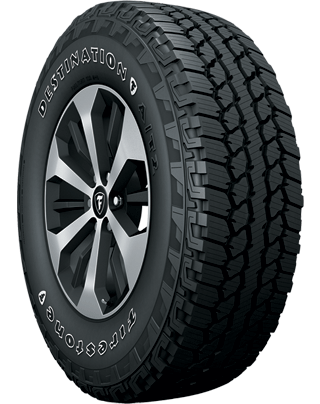
- Gold Pledge Limited Warranty
- All-Season
- Light Truck Tires
 Destination LE3
Destination LE3
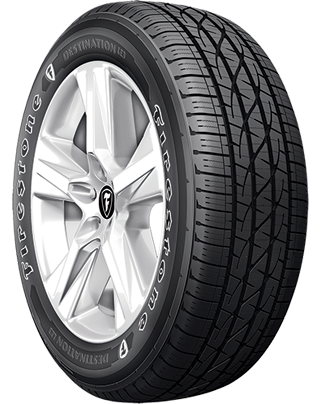
- No warranty
- All-Season
- Light Truck Tires
 Destination X/T
Destination X/T
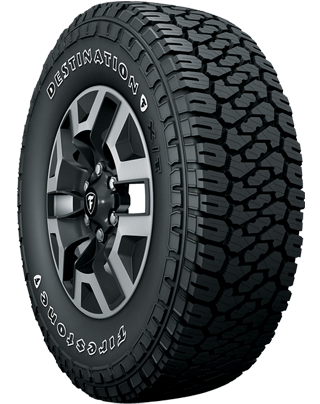
- Gold Pledge Limited Warranty
- All-Season
- Light Truck Tires
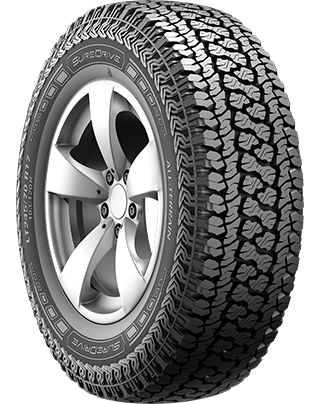
- No warranty
- All-Season
- Light Truck Tires
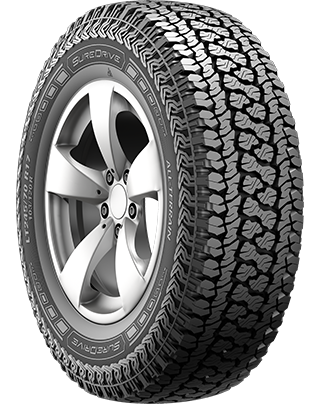
- No warranty
- All-Season
- Light Truck Tires
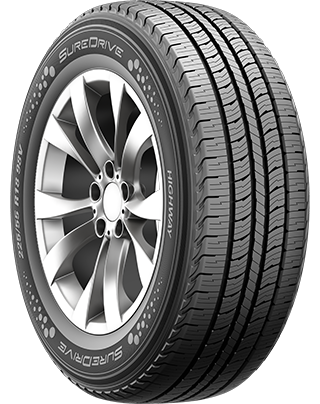
- No warranty
- All-Season
- Light Truck Tires
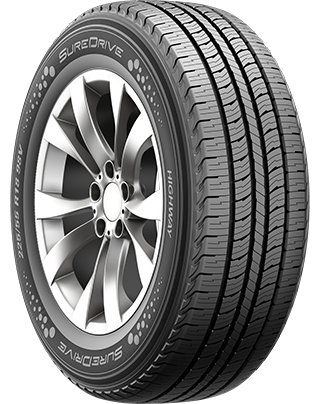
- No warranty
- All-Season
- Light Truck Tires
 OPEN COUNTRY A/T III
OPEN COUNTRY A/T III
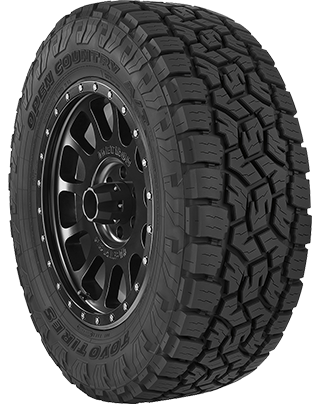
- No warranty
- All-Season
- Light Truck Tires
2020 Toyota 4Runner Tire Information
Apart from finding the right tire size, you also want to think about a couple of other things when getting new Toyota 4Runner tires like which tire brands you like most and where you drive. Think about where you live (countryside vs. city vs. mountains) and the kind of unexpected weather you're likely to experience when evaluating your driving conditions. Many drivers who live in states that experience all four seasons choose to purchase two sets of tires: one set for winter, one set for summer. Other drivers buy one set of all-season tires instead. That way they don't have to return to the tire shop and their vehicle is always ready for sun, rain, and light snow!
Driving style is next on the list to think about when buying tires. If you're an avid off-roader who yearns to pioneer new paths, you have very different tire needs than a highway commuter who doesn't hit the hills very often. Talk to a tire technician at Firestone Complete Auto Care for help choosing the best tire for you, or start shopping for Toyota 4Runner tires online.
Installing Toyota 4Runner Tires
We sell tires, but we also service them and care for all the around-the-wheel components. We're your one-stop shop for tire installation, rotation, and ongoing maintenance! We make it easy to buy new 2020 Toyota 4Runner tires online and book an installation appointment at the same time.
2020 Toyota 4Runner Tire Q&A
-
Is Toyota tire inflation important? The right tire pressure can make all the difference. Proper tire inflation helps increase fuel economy, improve braking time, and boost tire lifespan! Even a small change in tire pressure can impact your driving.
-
What do the numbers on my Toyota 4Runner tires mean? Your tire sidewall numbers tell you the recommended load carrying capacity, speed rating, treadwear, traction, and tire size. Talk to a tire technician to learn how to read Toyota tire numbers.
-
How do I check the tread depth on my Toyota tires? Stay on top of your tire tread depth to help avoid a dangerous drive. You can check tread depth with a penny. Hold the penny so that Abraham Lincoln is facing you, then place your penny into a tread groove upside down. If you can see the top of Abe’s head, your tread is shallow and it might be time for new Toyota 4Runner tires. Grab a penny. Hold the so that Abe Lincon's head is facing you and his hair is pointing toward the ground. Then, place the penny into a tread groove. If you can see the top of Abe’s head, your tread is shallow and it might be time for new Toyota 4Runner tires.
Repair Services for Your 2020 Toyota 4Runner
When to repair, when to replace? Click on a repair below to learn more about Toyota 4Runner repairs at Firestone Complete Auto Care.
2020 Toyota 4Runner Repair Information
Car repairs: for many drivers, that phrase is a dreadful one. We’re here to change that, though. At Firestone Complete Auto Care, we want to make car repair painless and hassle-free. Bring your 2020 Toyota 4Runner in for repair services and our skilled repair technicians will get your 4Runner back on the road. We’ll start by assessing what repairs may be needed, and we’ll provide you with a detailed explanation of what we recommend. We’ll never recommend a repair we don’t think is necessary for your safety or the performance of your Toyota.
How Much Are Toyota 4Runner Repairs?
Several factors can affect the cost to repair your 2020 Toyota 4Runner, including which repairs are needed, the cost of any replacement parts, the amount of labor necessary to get the job done, and the state you live in. But no matter your location, you may be able to save money with one of our many auto repair coupons or offers.
A few different aspects can influence repair costs for your 2020 Toyota 4Runner, like
2020 Toyota 4Runner Auto Repair Questions
-
Do I still need scheduled maintenance even when nothing is wrong with my Toyota? One of the best ways to prevent 2020 Toyota 4Runner repairs is by staying on top of your Toyota maintenance schedule. This schedule is written by the people who made your vehicle and they know best how to keep it running smoothly.
-
Should I bring my Toyota in even if I can't pinpoint the problem? No, we’re not talking about finding the best jams on the radio! You know your car best, and you’re the first person who will notice if something doesn’t feel right (like new smells, sights, or sounds coming from your car). If you sense that something is 'off,' stop in for a Courtesy Check to have these symptoms checked out ASAP. Early action could help you prevent Toyota 4Runner repairs.
-
Do I have to get the repairs you recommend for my Toyota? Trust is more than just a saying on the wall. It’s a window underneath it. That’s why we won’t recommend services or repairs for your 2020 Toyota 4Runner unless we think they’re vital to your safety on the road.
2020 Toyota 4Runner Brake Repair
Your Toyota 4Runner may be powered by a strong engine. But if you can’t stop it, it’s as good as scrap metal. If you’re experiencing squeaky brakes or a loss of braking power, don’t wait! Safe driving is difficult when your brakes are anything but their best. Plus, waiting can lead to more expensive parts wearing out and requiring replacement. Visit Firestone Complete Auto Care for the right brake repair for your 2020 Toyota 4Runner. We offer many affordable brake repairs like brake pad/shoe removal and replacement, rotor/drum resurfacing, brake fluid exchange/bleeding, and wheel cylinder and brake caliper installation.
Questions About Your Toyota 4Runner Brakes
-
Why is my 4Runner shaking as I brake? Your 4Runner could shake when you brake due to worn brake pads or rotors, warped rotors, loose or worn suspension components, or faulty brake calipers. You can always schedule a free brake inspection at the first sign of strange brake behavior.
-
How often do I need to replace my 4Runner brake pads? Brake pads generally last between 30,000 and 40,000 miles. Your driving can affect how long your 4Runner brake pads last, though. For example, mainly driving on highways and gradually braking can help increase the lifespan of your brake pads, and carrying hefty loads or riding your brakes can shorten it.
-
Is it bad if my 4Runner is leaking brake fluid when off? Because your 4Runner brake system is a closed hydraulic system, it should not leak brake fluid. However, if components in your brake system have worn out or been damaged, it might cause brake fluid to leak.
2020 Toyota 4Runner Drivetrain Repairs
You don't want to go to just anyone for drivetrain repair. Drivetrains for front, rear, and all-wheel-drive and 4WD vehicles are all different. You want to come see the technicians at Firestone Complete Auto Care. We can take care of most 2020 Toyota 4Runner drivetrain components Your Toyota could be crying out for driveshaft repair if you notice resistance when turning, heavy vibrations in your floorboards, clunks when shifting, or vibration as your vehicle accelerates.
Questions About 2020 Toyota 4Runner
-
How do I know if my Toyota drivetrain is damaged? Your Toyota 4Runner drivetrain might be damaged if you notice strange noises from the rear of your vehicle, see fluid leaking, or have issues turning.
-
What triggers the malfunction indicator light (MIL) in a 4Runner? If your 4Runner has its malfunction warning light (more commonly called the check engine light) illuminated, it could indicate engine troubles, problems with the transmission, electrical issues, malfunctioning sensors, connector problems, or misfire issues.
-
How worried should I be about a drivetrain malfunction in my 4Runner? If your 4Runner has a drivetrain malfunction, don't wait. Get it checked out by a professional mechanic. Identifying the underlying cause and performing the appropriate repairs right away can help prevent further damage and avoid unsafe driving conditions.
Wheel Alignment for 2020 Toyota 4Runner
Alignment services involve precise adjustments to your Toyota 4Runner’s suspension system, the connection between the vehicle and the wheels. In an alignment service, the individual angles of your tires are adjusted so that they come into contact with the road in just the right way — the way Toyota intended them to. When you bring in your 2020 Toyota 4Runner, we’ll perform an alignment check first. Then, we’ll adjust the angles as needed until they match recommended measurements from Toyota.
Toyota 4Runner Alignment Questions
-
Are there road conditions that can hurt my Toyota 4Runner alignment? Hitting a pothole or curb can alter your wheel alignment. So can general wear and tear over time.
-
How frequently should you get a wheel alignment for your 4Runner? Typically, your alignment should be checked every 6,000 miles or 6 months, whichever comes first. Double-check your 4Runner owner’s manual for Toyota's exact recommended schedule.
-
Do you need to get your 4Runner wheels aligned when you get new tires? You likely aren't required to get an alignment when you put new tires on your 4Runner, but it's a super smart idea! An alignment can help ensure optimal tire wear, fuel efficiency, and handling. Still, you should reference your 4Runner owner’s manual for what’s recommended.
Engine Repairs for Your 2020 Toyota 4Runner
If your 2020 Toyota 4Runner needs engine repair, our technicians will make sure you understand what’s going on before they start working on your engine. We never do any work without your sign-off. If a repair can wait, we'll let you know. If it's necessary for your safety, we'll make sure you understand that, too. We seek to give you all the info you need to make a smart decision about our services. By choosing Firestone Complete Auto Care for 4Runner engine repairs and you can feel confident knowing that we use Toyota-approved parts and components like the cambelt, engine oil seal, sensors, or other parts.
2020 Toyota 4Runner Engine Q&A
-
Why does the check engine light come on when I start my 4Runner? Generally, your check engine light turning on upon ignition is not a bad thing. It’s just your 4Runner firing up its circuits. The light should turn off in a bit, but come see us if it doesn't.
-
Are Toyota 4Runner engine noises bad? Strange engine sounds can be a sign something’s off in your Toyota 4Runner. Knocking or tapping could be a symptom of low oil. A high-pitched whistle could signal an intake leak or misaligned belt. Squealing can be traced back to a loose fan belt, and grinding might be a sign of brake problems rather than engine issues.
-
Are you unknowingly damaging your Toyota 4Runner engine? Some driving habits are not so great for your engine. These include driving on a near-empty gas tank, flooring the gas pedal while the car is in Park, or accelerating too quickly, too soon. Protect your engine’s performance and efficiency by distancing yourself from these habits.
2020 Toyota 4Runner Tire Repair
Firestone Complete Auto Care is here for you when your 2020 Toyota 4Runner needs flat tire repair or inspection. In some cases, a tire doesn’t have to be replaced – it can be plugged and patched with a simple repair. Depending on the damage, though, a repair might not be the right move. Our technicians can determine which option is best for your situation. To start, we’ll consider the location of tire damage, the type of issue, the size and scope of the damage, and the amount of wear on your tires.
If a repair on your 2020 Toyota 4Runner tire is feasible and safe, we’ll get to work on the steps to fix it: (1) Remove the tire from the wheel for inspection and repair, (2) use a filler to close up the puncture (this is to keep moisture from getting in), and (3) secure and seal the inner tire liner to ensure the tire is airtight.
Your Questions About Toyota 4Runner Tire Repair, Answered
-
Can I drive my Toyota on a flat tire? Driving on a flat tire is not a good idea. Your 4Runner engine will keep running with a flat tire, but you could damage your wheel by continuing to drive on a flat.
-
Can I use an emergency/temporary sealant to fix my Toyota's flat tire? Temporary sealants will solve your problem… for a little bit. If you’ve seen temporary or emergency tire sealant before (it usually comes in a can), it can be tempting to turn to this as a solution for your flat tire. Keep in mind that these fixes could buy you some time to get to Firestone Complete Auto Care for a proper repair, but they could also cause some harm in the process (for example, damage to your TPMS). Plus, using a product like this could void your tire warranty.
-
Why do the tires on my 4Runner keep losing air? Your 4Runner tires might keep losing air due to a leaking valve stem, puncture or hole in the tire tread or sidewall, or damaged wheel.
2020 Toyota 4Runner Maintenance
Take care of your Toyota 4Runner and it'll take care of you. With the right maintenance at the right time, your 4Runner has a good chance of hitting 200,000 miles or more.
2020 Toyota 4Runner Maintenance Schedule
What is the manufacturer recommended maintenance schedule for a 2020 Toyota 4Runner? Find maintenance info for your vehicle.
About 2020 Toyota 4Runner Scheduled Maintenance
Instead of waiting for an issue to arise with your 4Runner, you can stay ahead of problems before they even begin. Just follow your 2020 Toyota 4Runner maintenance schedule! The recommended maintenance schedule is put together by Toyota, your vehicle manufacturer. Scheduled maintenance services can vary depending on driving conditions, climate, and other factors; however, recommended maintenance usually includes services like oil changes, tire rotations, brake pad replacement, filter changes, and fluid checks and exchanges. Staying on track with routine service appointments can help your 4Runner perform better, decrease your risk of dangerous malfunctions on the road, and prevent common 2020 Toyota 4Runner problems.
Learn About Vital Maintenance Needs for Your Toyota 4Runner
Head to your nearest Firestone Complete Auto Care in your 2020 Toyota 4Runner for factory-recommended routine maintenance and our technicians will jump right in with a Courtesy Check. The Courtesy Check helps us see what we’re working with under the hood, and allows us to alert you to any potential problems before they worsen. During a Courtesy Check, we’ll always check your battery, then we’ll move on to inspect your 4Runner’s head and tail lights, tires, fluid levels, alignment, and windshield wipers.
Firestone Complete Auto Care is your spot for 2020 Toyota 4Runner maintenance. Don’t wait until something goes wrong with your car. Visit your nearest location for proactive maintenance today.
2020 Toyota 4Runner Maintenance Q&A
-
What should I do after hitting a pothole in my Toyota 4Runner? You know your Toyota 4Runner better than anyone else, so you’ll know if something doesn’t feel right while driving. Have your alignment checked (and adjusted if necessary) as soon as you notice a pulling steering wheel to prevent suspension damage or uneven tire wear.
-
When should I use high mileage oil in my Toyota 4Runner? Do you have more than 75,000 miles on your Toyota 4Runner? If so, request to switch to high mileage oil at your next oil change. This type of oil is specially formulated to keep aging engine parts in the best possible condition.
-
Can I ignore dashboard lights on my Toyota? Don't ignore dashboard warning lights! Bring your Toyota 4Runner in for a diagnostic code scan as soon as a dashboard warning light flashes on, whether it's your check engine or battery light. Dashboard lights alert you to trouble under the hood.
2020 Toyota 4Runner Battery Replacement & Size
Need more info about Toyota 4Runner batteries?
| Battery | Engine | Warranty | Cold Cranking Amps | |
|---|---|---|---|---|
| 24F-3 | V6/4.0L | Replacement 24 months | Performance months | 650 |
| 35-2 | V6/4.0L | Replacement 36 months | Performance months | 640 |
| 24F-RP | V6/4.0L | Replacement 48 months | Performance months | 750 |
Car Batteries for 2020 Toyota 4Runner
On average, auto batteries last anywhere from three to five years. Check your battery regularly and replace it as needed so it doesn’t leave you and your Toyota 4Runner stranded. Look out for symptoms of a faulty car battery. A lagging starter, an illuminated battery or check engine light, bloated battery case, corroded battery posts, or dim headlights may all indicate that your battery is waving goodbye.
You can also get a Free Battery Test at your local Firestone Complete Auto Care. Drop in for a free battery check and, if necessary, a battery replacement to help keep your 2020 Toyota 4Runner running! Automotive batteries are just one of our many areas of expertise. Our technicians are well-acquainted with Toyota’s service specs for 4Runner battery cold cranking amps and reserve capacity. Get help choosing the battery size that fits your car perfectly, and schedule a weekday or weekend battery replacement service for your car.
Commonly Asked Toyota 4Runner Battery Questions
-
Why doesn’t my Toyota 4Runner battery stay charged? A battery is in its final hour when it will no longer hold a charge. The battery may be too old. Or, you may have been leaving your car doors ajar and the cabin light at night. Stop by for a complimentary battery check at your favorite Firestone Complete Auto Care and get a handle on your car battery’s health.
-
How long can I expect my car battery to last? A car battery normally lasts three to five years, but this number can vary based on battery type, your driving habits, and battery maintenance.
-
Why is there white, crusty buildup on my 4Runner’s battery post? The white, crusty stuff that can accumulate around 4Runner car battery terminals is called corrosion. It is caused by a chemical reaction between the battery acid and the air, which creates a white, powdery substance that can build up on the terminals over time. Corrosion can interfere with the flow of electricity between the battery post and the car's electrical system, sometimes leading to poor electrical performance, difficulty starting, and even premature battery failure.
2020 Toyota 4Runner Oil Change Service
Your 2020 4Runner’s oil should be changed according to Toyota’s recommended oil change intervals. Your 4Runner may need an oil change right away if your check engine/oil change light is on, you hear knock knock knock coming from the engine, smell oil inside the vehicle, or notice an unusual amount of exhaust. You may also need an oil change more frequently than Toyota recommends if you haul heavy loads, drive in dusty areas, adventure off-road, or go at low speeds on long distance trips.
Whether you need high mileage oil, synthetic oil, or conventional oil, you'll find the right 2020 Toyota 4Runner motor oil at Firestone Complete Auto Care. Check your owner's manual and talk with a technician to select the right Toyota 4Runner oil, whether it's Quaker State® Advanced Durability™ conventional oil, Pennzoil® High Mileage Vehicle® motor oil, Pennzoil Platinum® Full Synthetic motor oil with PurePlus™ Technology, or Shell Rotella® heavy-duty engine oil. During your oil change service, one of our techs will change your 4Runner’s oil, replace and recycle your used oil and oil filter, inspect the rest of your car’s filters, top-off essential fluids, and perform a free inspection on the rest of your vehicle. Let the experts take care of your 4Runner’s engine by making an oil change appointment today.
Oil Change Q&A for Your 2020 Toyota 4Runner
-
What can cause the oil light on my Toyota 4Runner to illuminate? Your Toyota 4Runner oil change reminder light may come on if you're overdue for an oil change. The oil pressure light will typically come on if the oil level in the engine is too low, the oil pump is failing, you have a clogged oil filter, or there's a faulty oil pressure sensor.
-
Can I change my Toyota 4Runner oil at home? Changing engine oil at home isn’t as simple as it’s made out to be. You’ll have to figure out how to properly dispose of the oil and buy special tools. Having your oil changed professionally can not only reduce the risk of something going wrong during the service, but it’ll also help your car perform smoothly down the road.
-
Why is my Toyota exhaust smoke gray or blue? There could be an oil leak and your engine is burning oil. Time to have a qualified technician check things out. The leak could be caused by several issues like leaking valve seals, damaged piston rings, or worn cylinder walls.
2020 Toyota 4Runner Tune-Up & Engine Service
Routine engine tune-ups can bring power back to your 4Runner. Your nearest Firestone Complete Auto Care location has several options to choose from when it comes to Toyota 4Runner engine tune-up services. One option is the standard Firestone Tune-Up. The standard Firestone Tune-Up includes new spark plugs (and installation!), a thorough inspection of engine components, and a lifetime parts warranty*. The second service focuses on your 4Runner's filters, specifically replacing the air filter and fuel filter. The third tune-up option is a fuel system cleaning service, which is a three-step process that removes varnish, dirt, and carbon deposits on your 4Runner's fuel injectors, throttle body, and throttle plate. The result? Restored fuel system performance. Keep in mind that your 4Runner's mileage and maintenance history can uniquely impact its tune-up needs. Ask one of our technicians what your vehicle needs, based on your driving habits and your car’s current condition.
*Check with a teammate at Firestone Complete Auto Care for complete terms and conditions regarding warranties.
Common Engine Tune-Up Q&A for 2020 Toyota 4Runner
-
What happens if my Toyota 4Runner spark plugs fail? Replace spark plugs on time or about every 30,000 miles or so. Spark plugs are small but mighty. The spark of electricity that the plug emits across a small gap creates the ignition for the combustion needed to start your car. Without that spark, your car won't start.
-
What does a puddle underneath my Toyota 4Runner mean? Don't ignore puddles of fluid under your Toyota 4Runner. It could signal a coolant leak, brake fluid leak, or an oil leak. Let any one of these leaks linger and it could cause engine damage.
-
How frequently do the fuel injectors in my Toyota 4Runner need to be cleaned? The frequency at which car fuel injectors should be cleaned can vary depending on several factors, including the type of fuel used and the driving conditions. Some manufacturers generally recommend a fuel system cleaning as part of your general car maintenance, or as needed based on symptoms of poor fuel system performance.
2020 4Runner Toyota Steering & Suspension Services
When you first bought your 2020 Toyota 4Runner, you and your passengers probably enjoyed a ride that was smooth and balanced. Lately, though, your ride’s been feeling a little bumpy. Maybe your 4Runner jolts, pulls to one side, or makes an unusual noise when going over a speed bump. The first sign of problems is a good time to bring your 2020 Toyota 4Runner in for suspension and steering service. We'll get to the root of the problem and, if your 4Runner suspension system needs repair, we’ll go over the services you need and how much they will cost before we do any work.
2020 4Runner Steering & Suspension Q&A
-
Why is my Toyota 4Runner bouncing so much? Damaged struts or shocks can't dampen road bumps properly, causing your vehicle to feel like a trampoline after each dip or bump.
-
Why does my 4Runner tilt forward when I hit the brakes? The forward dip in the front end of your 4Runner when you brake is caused by the weight and momentum transferring to the front wheels. If your suspension system is in bad shape, it can fail to distribute this force, leading your front end to dip further downward.
-
What role do tire pressure and tread depth play in my Toyota's suspension? Proper tire care can reduce strain on the suspension system, and also alert you to the need for new tires. Uneven tire wear is one sign of steering and suspension system problems, but it can also contribute to more.
A/C Service for Your 2020 Toyota 4Runner
Technicians at Firestone Complete Auto Care are ready to help you address your 2020 Toyota 4Runner A/C problems. In this A/C performance inspection, we’ll check out the current condition of your 2020 Toyota 4Runner A/C system to see if repair work is required. This check will include an examination of system pressure, a visual inspection, and a leak test.
When we perform an A/C repair on your 2020 Toyota 4Runner, we’ll also do an A/C evacuation and recharge. To start this process, a technician will flush out the old refrigerant from your vehicle’s A/C system. Then, they’ll perform an evacuation (also known as a discharge) on the entire system per Toyota guidelines. The A/C system is recharged with new refrigerant.
2020 Toyota 4Runner A/C System FAQs
-
Why is my 4Runner A/C blowing hot air? If your car’s air conditioning isn’t blowing cold air at all (or it tries, then turns warm), you could have a clogged expansion valve, a faulty compressor clutch, a leak, or a malfunctioning fuse in the system.
-
How does my A/C system get a leak? To put it simply, age and moisture are some of the main causes of leaks in your A/C. Over time, rubber gaskets and seals can wear out, which pushes much-needed refrigerant out of your 4Runner’s A/C system — and lets outside moisture get in, which can take a toll on internal A/C components.
-
Why does my vehicle have to be moving for my 4Runner’s A/C to work? Damaged or worn components in your 4Runner’s electrical or air conditioning system can cause the A/C to only work when the car is moving. You may be dealing with low coolant or a faulty cooling fan.
2020 Toyota 4Runner Transmission Service & Repairs
The transmission delivers power from the engine to the wheels so that you can drive on your terms. Because of the transmission’s responsibility to translate the right dose of power into the right amount of speed, even the smallest transmission problems should be addressed right away. 2020 Toyota 4Runner transmission problems can show up as shifting delays, jumping or grinding during acceleration, the car shaking on the road, or whistling noises or a burning smell coming from beneath the hood. If you ignore Toyota 4Runner transmission issues you could see your fuel economy decrease or find that you can't drive your 4Runner at all. Our expert techs are familiar with 2020 4Runner services and perform them according to Toyota-recommended specifications. If you think there’s something wrong with your 4Runner’s transmission, schedule an appointment at your local Firestone Complete Auto Care to help keep your engine running at peak performance.
2020 Toyota 4Runner Transmission Q&A
-
Does my 4Runner's transmission fluid need to be inspected? Caring for your Toyota 4Runner’s transmission fluid is a great way to help it perform. About every 30,000 to 60,000 miles is a good timeframe for having your transmission fluid inspected and perhaps changed. Service intervals can vary depending on how you use your Toyota, so check with your technician first. Luckily, leaks and low fluid levels are easy to spot and inexpensive to fix.
-
Can transmission fluid leak from my Toyota 4Runner? Yes. Toyota 4Runner transmission fluid can leak as time passes, which may lead to transmission problems. Transmission fluid leaks are often caused by worn or damaged transmission components, such as the transmission pan, cooler lines, seals, or housing. An overfilled transmission may also be behind your transmission fluid leak.
-
Can I still drive my Toyota 4Runner if it has a transmission fluid leak? Driving your 4Runner with a transmission fluid leak is highly discouraged. Transmission fluid is vital to the smooth operation of your transmission system, and a leak can put the entire system at risk. A transmission fluid leak may lead to decreased performance, overheating, and possibly even transmission failure.
2020 Toyota 4Runner Inspections
At Firestone Complete Auto Care, we perform a multi-point Courtesy Check during any vehicle service. The technician will begin by testing your Toyota 4Runner's battery to determine how much charge remains. The check will continue with a visual inspection of your Toyota 4Runner's filters, lights, wiper blades, alignment, tires, hoses, belts and fluid levels.
We perform a Courtesy Check any time you bring your car to a local Firestone Complete Auto Care for service, but you can also request a Complete Vehicle Inspection for your 2020 Toyota 4Runner if you suspect there may be a bigger problem. A Complete Vehicle Inspection includes everything in a Courtesy Check, plus a hands-on examination of your exhaust system, steering and suspension, and brakes. With this inspection, we want to help you stay on top of any issues that may wreak havoc on your 2020 Toyota 4Runner if left unaddressed.
Depending on your location, you may be able to take care of your state inspection or safety test at your local Firestone Complete Auto Care. Inspections are performed on a state-by-state basis and requirements vary.
Common 2020 Toyota 4Runner Vehicle Inspection Questions
-
How do I know if I should have an inspection on my Toyota 4Runner? It needs a check-up if something feels 'off' to you, the driver. Your Toyota 4Runner could benefit from a Courtesy Check if it has any illuminated dashboard lights, you hear weird noises coming from any part, the engine doesn't start sometimes, or your vehicle pulls to one side.
-
My 2020 Toyota 4Runner failed the state inspection test. Can you fix it? There's a good chance we can. Stop by for a full system inspection and we'll get to the root of the issue.
-
What's the ideal timing for a full vehicle inspection on my Toyota 4Runner? You should bring your Toyota 4Runner in for a full vehicle inspection if something weird happens and you can’t find the problem. A new dashboard light might come on, you may hear strange sounds under the hood, or your steering might feel off. A complete inspection is also a great idea before a road trip for added peace of mind.
2020 Toyota 4Runner Radiator Repair & Service
Regular, proactive service on the radiator in your 2020 Toyota 4Runner is a huge factor in the longevity of your engine. To keep your radiator functioning, Toyota recommends replacing your antifreeze or coolant at scheduled intervals but it’s also wise to keep an eye out for signs of a failing radiator. You could be on the verge of a radiator-induced engine breakdown if you see coolant leaks under your car, high engine temperatures, or a dashboard light that indicates low coolant.
At Firestone Complete Auto Care, we start by performing a thorough inspection of your Toyota 4Runner cooling system. Then, we’ll move on to a machine-powered coolant exchange. Finally, we’ll refill the flushed sealants, lubricants and chemicals, then do a pressure check to catch any possible leaks. When it comes to radiator service and repair, we’re here to give your 2020 Toyota 4Runner the top-notch service it needs.
2020 Toyota 4Runner Radiator Q&A
-
What does an illuminated coolant temperature light mean for my Toyota? Pay attention to the temperature gauge and lights on your dashboard. If a low coolant warning light comes on or your dashboard temperature gauge keeps rising, it’s likely that your engine is about to overheat (and could leave you stranded on the road). Wait for the engine to cool down, then have your coolant system checked immediately at your nearest Firestone Complete Auto Care.
-
What is causing my 4Runner to overheat? If your Toyota 4Runner engine overheats, it could be because of a clogged radiator, a damaged thermostat, a faulty cooling fan, a malfunctioning water pump, or low coolant levels.
-
Why does the radiator in my 4Runner sound like it’s rumbling or boiling? Air pockets in your 4Runner’s cooling system may cause a rumbling or boiling noise. You could also have a clogged radiator or simply need to replace the radiator cap.